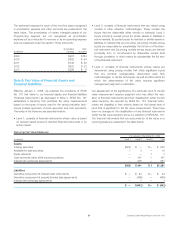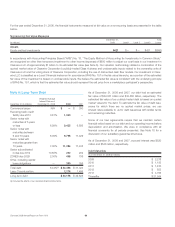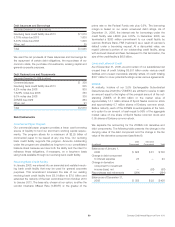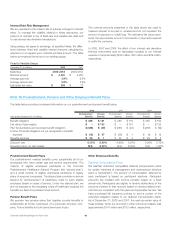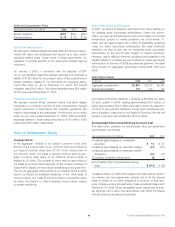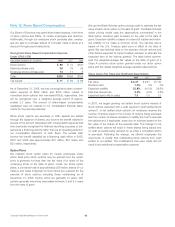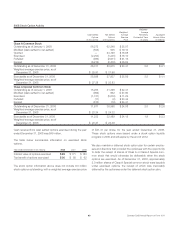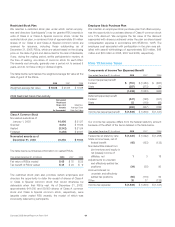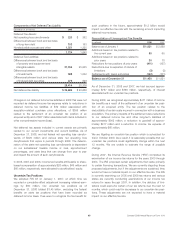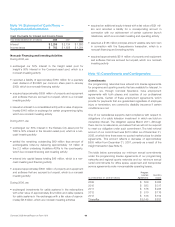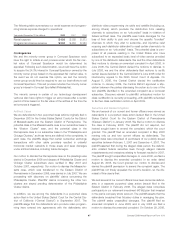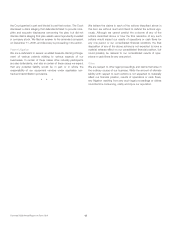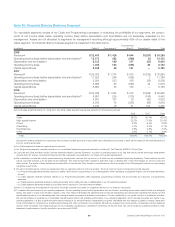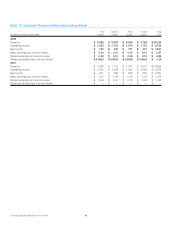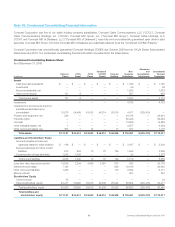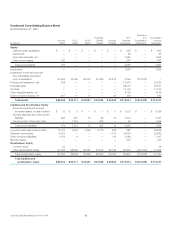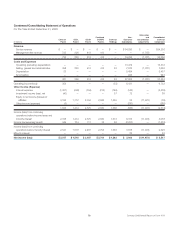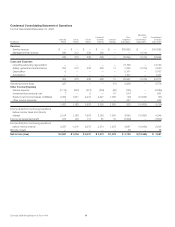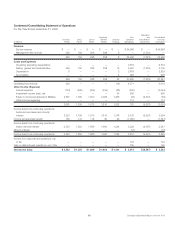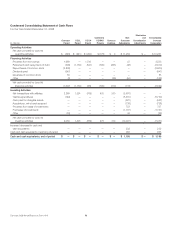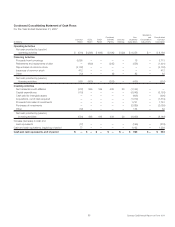Comcast 2008 Annual Report Download - page 69
Download and view the complete annual report
Please find page 69 of the 2008 Comcast annual report below. You can navigate through the pages in the report by either clicking on the pages listed below, or by using the keyword search tool below to find specific information within the annual report.
The following table summarizes our rental expense and program-
ming license expense charged to operations:
Year ended December 31 (in millions) 2008 2007 2006
Rental expense $ 436 $ 358 $ 273
Programming license expense $ 548 $ 484 $ 350
Contingencies
We and the minority owner group in Comcast Spectacor each
have the right to initiate an exit process under which the fair mar-
ket value of Comcast Spectacor would be determined by
appraisal. Following such determination, we would have the option
to acquire the 24.3% interest in Comcast Spectacor owned by the
minority owner group based on the appraised fair market value. In
the event we do not exercise this option, we and the minority
owner group would then be required to use our best efforts to sell
Comcast Spectacor. This exit process includes the minority owner
group’s interest in Comcast SportsNet (Philadelphia).
The minority owners in certain of our technology development
ventures also have rights to trigger an exit process after a certain
period of time based on the fair value of the entities at the time the
exit process is triggered.
Antitrust Cases
We are defendants in two purported class actions originally filed in
December 2003 in the United States District Courts for the District
of Massachusetts and the Eastern District of Pennsylvania. The
potential class in the Massachusetts case is our subscriber base in
the “Boston Cluster” area, and the potential class in the
Pennsylvania case is our subscriber base in the “Philadelphia and
Chicago Clusters,” as those terms are defined in the complaints. In
each case, the plaintiffs allege that certain subscriber exchange
transactions with other cable providers resulted in unlawful
horizontal market restraints in those areas and seek damages
under antitrust statutes, including treble damages.
Our motion to dismiss the Pennsylvania case on the pleadings was
denied in December 2006 and classes of Philadelphia Cluster and
Chicago Cluster subscribers were certified in May 2007 and
October 2007, respectively. Our motion to dismiss the Massachu-
setts case, which was transferred to the Eastern District of
Pennsylvania in December 2006, was denied in July 2007. We are
proceeding with discovery on plaintiffs’ claims concerning the
Philadelphia Cluster. Plaintiffs’ claims concerning the other two
clusters are stayed pending determination of the Philadelphia
Cluster claims.
In addition, we are among the defendants in a purported class
action filed in the United States District Court for the Central Dis-
trict of California (“Central District”) in September 2007. The
plaintiffs allege that the defendants who produce video program-
ming have entered into agreements with the defendants who
distribute video programming via cable and satellite (including us,
among others), which preclude the distributors from reselling
channels to subscribers on an “unbundled” basis in violation of
federal antitrust laws. The plaintiffs seek treble damages for the
loss of their ability to pick and choose the specific “bundled”
channels to which they wish to subscribe, and injunctive relief
requiring each distributor defendant to resell certain channels to its
subscribers on an “unbundled” basis. The potential class is com-
prised of all persons residing in the United States who have
subscribed to an expanded basic level of video service provided
by one of the distributor defendants. We and the other defendants
filed motions to dismiss an amended complaint in April 2008. In
June 2008, the Central District denied the motions to dismiss. In
July 2008, we and the other defendants filed motions to certify
certain issues decided in the Central District’s June 2008 order for
interlocutory appeal to the Ninth Circuit Court of Appeals. On
August 8, 2008, the Central District denied the certification
motions. In January 2009, the Central District approved a stip-
ulation between the parties dismissing the action as to one of the
two plaintiffs identified in the amended complaint as a Comcast
subscriber. Discovery relevant to plaintiffs’ anticipated motion for
class certification is currently proceeding, with plaintiffs scheduled
to file their class certification motion in April 2009.
Securities and Related Litigation
We and several of our current and former officers were named as
defendants in a purported class action lawsuit filed in the United
States District Court for the Eastern District of Pennsylvania
(“Eastern District”) in January 2008. We filed a motion to dismiss
the case in February 2008. The plaintiff did not respond, but
instead sought leave to amend the complaint, which the court
granted. The plaintiff filed an amended complaint in May 2008
naming only us and two current officers as defendants. The
alleged class was comprised of purchasers of our publicly issued
securities between February 1, 2007 and December 4, 2007. The
plaintiff asserted that during the alleged class period, the defend-
ants violated federal securities laws through alleged material
misstatements and omissions relating to forecast results for 2007.
The plaintiff sought unspecified damages. In June 2008, we filed a
motion to dismiss the amended complaint. In an order dated
August 25, 2008, the Court granted our motion to dismiss and
denied the plaintiff permission to amend the complaint again. The
plaintiff has not timely appealed the Court’s decision, so the dis-
missal of this case is final.
We and several of our current officers have been named as defend-
ants in a separate purported class action lawsuit filed in the
Eastern District in February 2008. The alleged class comprises
participants in our retirement-investment (401(k)) plan that invested
in the plan’s company stock account. The plaintiff asserts that the
defendants breached their fiduciary duties in managing the plan.
The plaintiff seeks unspecified damages. The plaintiff filed an
amended complaint in June 2008, and in July 2008 we filed a
motion to dismiss the amended complaint. On October 29, 2008,
67 Comcast 2008 Annual Report on Form 10-K


